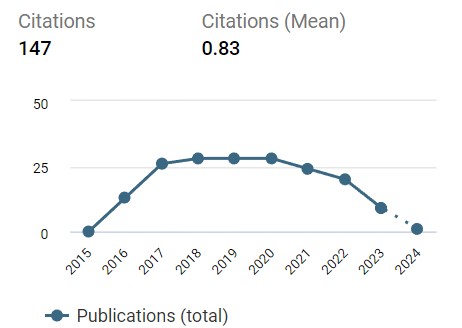The Effect of Students' Learning Activities and Creativity on The Learning Outcomes in The Aerodynamics
DOI:
https://doi.org/10.21831/dinamika.v6i1.37035Keywords:
Learning activities, Student creativity, Learning achievementAbstract
References
Azwar, S. (2009). Tes Prestasi. In Pustaka Pelajar. Yogyakarta: Pustaka Pelajar.
Barbot, B. (2011). Assessing Creativity in the Classroom. The Open Education Journal, 4(1), 58–66.
Billett, S. (2011). Vocational education: Purposes, traditions and prospects. New York: Springer.
Clarke, Linda; Winch, C. (2007). Vocational education. New York: Routledge.
Dimyati; Mudjiono. (2013). Belajar dan Pembelajaran. Jakarta: Rineka Cipta.
Gaut, B. (2010). The Philosophy of Creativity. Philosophy Compass. https://doi.org/10.1111/j.1747-9991.2010.00351.x
Guilford, J. P. (1968). Creativity, intelligence and their educational implications. In null.
Hadi, S. (1987). Analisis Regresi. Yogyakarta: Andi Offset.
Marwanto, A., Hendrik, N., & Prasetya, T. A. (2020). The development of tungsten inert gas welding practical manual for vocational high school. Journal of Physics: Conference Series, 1446(1). https://doi.org/10.1088/1742-6596/1446/1/012005
Munandar, U. (2012). Pengembangan Kreativitas Anak Berbakat. Jakarta: Rineka Cipta.
Nurgiyantoro, B. (2002). Statistik Terapan. Yogyakarta: Gadjah Mada University Press.
Prasetya, T. A., & Harjanto, C. T. (2020a). Improving Learning Activities And Learning Outcomes Using The Discovery Learning Method. VANOS Journal of Mechanical Engineering Education, 5(1), 59–66.
Prasetya, T. A., & Harjanto, C. T. (2020b). Pengaruh Mutu Pembelajaran Online Dan Tingkat Kepuasan Mahasiswa Terhadap Hasil Belajar Saat Pandemi Covid19. Pendidikan Teknologi Dan Kejuruan, 17(2), 188–197.
Santrock, J. W. (2011). Psikologi Pendidikan (3rd ed.). Jakarta: Salemba Humanika.
Sardiman, A. M. (2011). Interaksi dan Motivasi Belajar Mengajar. Jakarta: Rajawali Pers.
Sudijono, A. (2008). Pengantar Evaluasi Pendidikan. Jakarta: Raja Grafindo.
Sugiyono. (2012a). Metode Penelitian Kuantitatif, Kualitatif dan R&D. Bandung: Alfabeta.
Sugiyono. (2012b). Statistika untuk Penelitian. Bandung: Alfabeta.
Sunarti; Rahmawati, S. (2012). Penilaian dalam Kurikulum 2013. Yogyakarta: ANDI.





